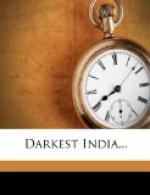For hundreds, probably thousands, in every large city, even this poor semblance of a home does not exist. Those who manage somehow or other to live on nothing a month, cannot certainly afford to pay three rupees, or even less, for a lodging. Whilst, no doubt, many of the submerged, tenth are not absolutely houseless, inasmuch as they are often able to share the shelter of some relation or friend, it cannot be doubted that a very large percentage of them might say, “Foxes have holes, and the birds of the air have nests,” but we “have not where to lay our heads.”
Of the homeless poor there are two classes. The more fortunate find shelter in those of the Dharamsalas, Temples and Mosques which contain provision for such purposes. It must be remembered, however, that a large number of such institutions are reserved for certain favored castes, and are not therefore available for the out-caste poor. For the rest, the uncertain shelter of verandahs, porticoes, market-places, open sheds, and, in fine weather, the road-way, esplanade, or some shady tree, have to suffice.
As already said, I am quite willing to admit that this question of shelter for the poor is of secondary importance as compared with that of their food-supply. And yet is it nothing to us that millions of the Indian poor have no place that they can call “home,” not even the meagre shelter of the one-roomed hut with which they would gladly be content? Is it nothing to us that superadded to the sufferings of hunger, they have to face the sharp and sometimes frosty air of the cold weather with scarcely a rag to their backs, and no doors, windows, or even walls to keep off the chilly wind? Is it nothing to us that in the rainy season they have to make their bed on the damp floor or ground, though to do so means a certain attack of fever? Is it nothing to us that under such circumstances the houseless poor should be converted into a dismal quagmire in which moral leprosy, more terrible than its bodily representative, should thrive and propagate itself? Certainly if the Indian destitute are to have a “bullock charter” granted to them, it will be necessary that it should sooner or later include suitable and decent shelter as well as food.
True, the problem is a vast one but this is no reason why it should be looked upon as insoluble, or left to grow year by year still vaster and more uncontrollable.
What we propose ourselves to undertake in this will be found elsewhere (see Part II Chapter VI). It must be remembered, moreover, that if our efforts to deal with the workless masses in finding them employment should prove successful this will in itself help to remove much of the existing evil. And by directing labor into channels where it can be the most profitably employed, we shall help to disembarrass those channels which have at present got choked up with an excess of it.




